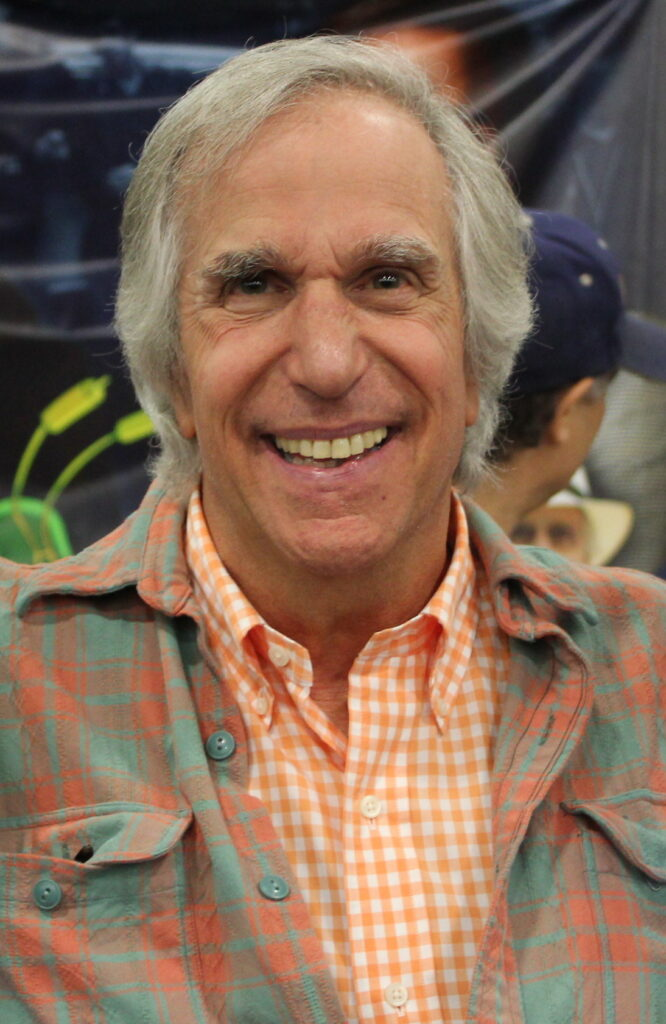Henry Winkler is forever etched in pop culture as “The Fonz” from the iconic sitcom Happy Days. But beyond the slick-haired, leather-jacketed exterior lies a story of resilience, perseverance, and untold challenges. His journey from a misunderstood child with undiagnosed dyslexia to a beloved actor and advocate is as inspiring as it is compelling.
The Early Years: Struggles with Undiagnosed Dyslexia

Winkler’s early life was anything but easy. Born to German-Jewish immigrants who fled Nazi Germany, he grew up in a household that held traditional values and demanded academic success. However, Winkler faced an invisible obstacle that constantly undermined his efforts—dyslexia. At the time, dyslexia was not widely understood, and his struggle with reading and schoolwork often resulted in frustration and harsh words from his parents, who referred to him as “Dummo Hund,” or “dumb dog” in German.
In school, his challenges were further compounded by the ridicule of teachers and classmates who mistook his dyslexia for laziness or lack of intelligence. But young Henry was determined to overcome. Despite the derogatory comments and low expectations, he found solace in storytelling and acting, hinting at the career that would later define his life.
Finding His Path: Yale School of Drama
The journey to stardom was a rocky one. Winkler applied to 28 colleges, only to receive acceptance from two. However, one of these was the prestigious Yale School of Drama. At Yale, he discovered an outlet for his creativity and passion. His challenges with reading were evident, yet his ability to improvise and think on his feet set him apart. He particularly shone during an improvised Shakespearean speech, which highlighted his innate talent and opened doors he had never imagined possible.
Yale became the place where Winkler’s self-confidence blossomed. He began to see that his learning disability did not have to limit his dreams. His acting skills, which relied on memorization and improvisation, became his strengths rather than his weaknesses.
Becoming Fonzie: The Role that Changed Everything
Henry Winkler’s portrayal of Arthur Fonzarelli, or “Fonzie,” on Happy Days is legendary. The role turned him into a cultural icon, the epitome of “cool” during the 1970s. However, behind the scenes, Winkler faced daily struggles. His dyslexia made reading scripts challenging, forcing him to memorize lines and rely on physical cues rather than written directions.
Interestingly, Winkler was initially hesitant to take on the character of Fonzie, fearing it might typecast him. He even turned down the lead role in Grease, cautious of being pigeonholed. Yet, his portrayal of Fonzie resonated with audiences, who saw in him not just a character but a symbol of coolness, independence, and resilience. His on-screen confidence contrasted sharply with his off-screen struggles, but he embraced the challenges, finding ways to make the role his own.
Discovering Dyslexia and Finding Purpose
It wasn’t until Winkler was in his 30s that he received a formal diagnosis for dyslexia. This moment came when he learned that his young nephew, Jed, shared the same struggles. The realization was transformative, bringing clarity to years of academic struggles and personal frustrations. At 31, he understood that his difficulties were not a reflection of his intelligence but a challenge that could be managed and overcome.
This discovery marked a turning point. Winkler became a vocal advocate for dyslexia awareness, striving to shed light on the struggles associated with learning disorders. He knew the pain of being misunderstood and belittled, and he wanted to help others avoid similar experiences.
Adapting to Life’s Challenges: A New Approach to Acting

Despite his dyslexia, Winkler continued to excel in his career, often compensating by memorizing his scripts. He adopted the technique of embodying the “essence” of his characters rather than relying heavily on precise lines. This approach allowed him to infuse his performances with authenticity and humor, making each character memorable.
Beyond Happy Days, Winkler worked on a range of projects, including the creation of the television series MacGyver. His versatility as an actor, producer, and writer highlighted his adaptability and willingness to take risks, even in the face of personal challenges.
A Legacy of Advocacy and Inspiration
Henry Winkler’s legacy extends far beyond his role as Fonzie. He has become an advocate for dyslexia awareness, co-authoring a series of children’s books called Hank Zipzer, inspired by his experiences growing up with a learning disorder. These books follow the story of a young boy with dyslexia and aim to provide encouragement to children facing similar struggles.
Through his work, Winkler has reached countless individuals who, like him, have faced challenges that others may not understand. He has used his platform to highlight the importance of compassion, understanding, and perseverance. Winkler’s journey serves as a beacon of hope for anyone who has been told they couldn’t achieve their dreams due to a disability or personal challenge.
Conclusion: A Life of Triumph Over Adversity
Henry Winkler’s life story is a powerful reminder that obstacles do not define us. From a young boy belittled for his struggles to an acclaimed actor, author, and advocate, he has shown that success is not about an effortless path but rather the resilience to overcome difficulties. His journey embodies the spirit of perseverance, demonstrating that true achievement lies in the courage to rise above one’s challenges.
Winkler’s story resonates with those who have faced adversity, offering a message of hope and determination. He has not only entertained generations but also inspired countless individuals to embrace their differences and never give up on their dreams. Henry Winkler, beyond being an icon of cool, has become a symbol of strength, compassion, and enduring success.


